Thylungra
Thylungra Station is a pastoral lease that operates as a sheep station in Queensland.
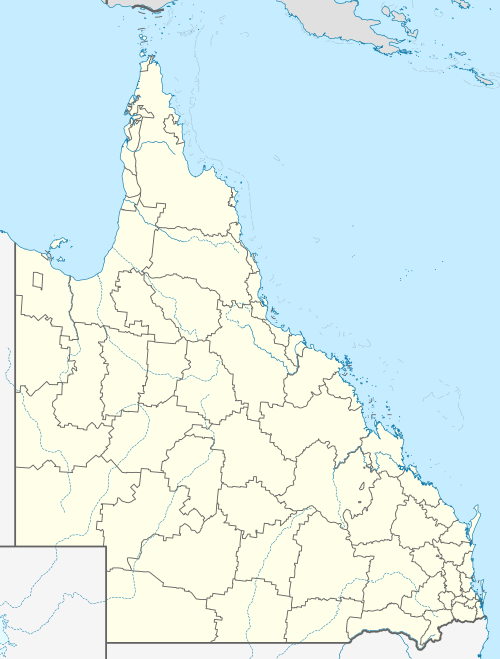
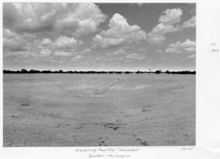
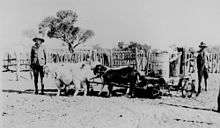
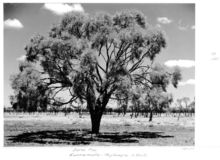
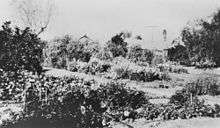
Description
The property is situated approximately 101 kilometres (63 mi) north west of Quilpie and 108 kilometres (67 mi) south east of Windorah. Neighbouring properties include the Milo and Budgerygar aggregation and Arleun Station that are all owned or leased by George Scott, the current owner of Thylungra.[1] It is situated in the Channel Country on Kyabra Creek, a tributary of Cooper Creek.[2]
The property is predominantly open downs flood-out country with black soils to the south with large areas of gidyea stands interspersed with low sandhills. The north is mostly mulga country with remainder of the property being stony range country.[3] The area is mostly Mitchell grass, Flinders grass, blue grass, bluebush, buttongrass, burr and neverfail on the floodplains. Timbered areas contain stands of gidyea, mulga, coolibah, yarpunyah, bloodwood and supplejack.[3]
History
The traditional owners of the area are the Punthamara people, also rendered Buntamurra, who have inhabited the area for thousands of years.[4]
The name Thylungra is taken from the Buntamurra phrase thillung gurra meaning permanent water, as one of the waterholes in the area was thought to be permanent.[5]
The property was initially established as a cattle station by pioneer Patrick Durack in 1868, [6] along with nearby Kyabra Station.[2]
By 1878 the property had been placed on the market, along with adjoining Bungindery Station. At this stage they occupied a combined area of 2,525 square miles (6,540 km2) and were stocked with 9,000 head of cattle and 300 horses.[7]
In 1882 Durack left Thylungra to establish Argyle Downs Station in the Kimberley. He started out with approximately 7,250 head of cattle and 200 horses, which he overlanded about 3,000 miles (4,828 km). Half the stock did not survive the journey, which Durack completed nearly two and a half years later.[2]
Thylungra was sold some time in 1884 although Durack had legal action taken against him to recover the commission still owed to the company that sold the property.[8] The purchasers were the Queensland Cooperative Pastoral Company, who placed it on the market when it went into liquidation along with several other properties including Galway Downs, Buckingham Downs and Pikedale in 1886. At this time Thylungra occupied an area of 1,800 square miles (4,662 km2) and was stocked with 15,000 cattle and 200 horses.[9] By 1890 the property was owned by the Thylungra Pastoral Company.[10]
By 1896 the lessee was the Union Bank of Australia and the property was being managed by Henry Roche.[11] The area was in its third year of drought in 1897 with very little feed on the ground.[12] By 1902 the property was almost completely destocked.[13]
At some time prior to 1906 the property had been stocked with sheep. In the same year the property was purchased by John Leahy, Robert Philip and James Forsyth. The property encompassed an area of about 1,000 square miles (2,590 km2) of country.[14]
Shearers went on strike at Thylungra in 1910 demanding that better equipment be installed before they went back to work.[15] The following year over 100,000 sheep were to be shorn at Thylungra.[16] Leahy died in 1909 and his interest in the property was sold to Forsythe and Philip. Thylungra produced 107 bales of wool weighing over 18 long tons (18 t) in 1913, at which time Munro's name was also on the lease.[17]
Thylungra was sold in 1992 by Toni Woods of Goondiwindi to Clyde Agricultural.[1]
In 2008 the Clyde Agricultural Company sold Thylungra for A$10.5 million to George Scott in a private sale after it had been passed in at auction a month earlier. The property occupied an area of 2,820 square kilometres (1,089 sq mi) and was stocked with 45,000 sheep and almost 2,000 head of cattle.[6]
See also
References
- "Thylungra sheep station". Highland Pony. Retrieved 18 September 2014.
- Mary Durack (1972). "Durack, Patrick (1834–1898)". Australian Dictionary of Biography. Australian National University. Retrieved 19 September 2014.
- "'Thylungra Station' Quilpie Qld". realestate.com.au. 9 October 2008. Retrieved 21 September 2014.
- "Punthamara (Qld)". Tindale's Catalogue of Australian Aboriginal Tribes. South Australian Museum. 13 May 2014. Retrieved 20 September 2014.
- "Thylungra Station". Kevin and Ruth Sheather. 2010. Retrieved 20 September 2014.
- "Clyde finally shifts Thylungra for $10.5m". Stock and Land. Fairfax Media. 9 August 2014. Retrieved 19 September 2014.
- "Classified Advertising". The Queenslander. Brisbane, Queensland.: National Library of Australia. 9 November 1878. p. 163. Retrieved 20 September 2014.
- "Law Report – Supreme court". The Sydney Morning Herald. New South Wales: National Library of Australia. 22 September 1885. p. 4. Retrieved 20 September 2014.
- "Classified Advertising". The Queenslander. Brisbane, Queensland: National Library of Australia. 25 September 1886. p. 2. Retrieved 20 September 2014.
- "Stock Movements and State of the Country". The Queenslander. Brisbane, Queensland: National Library of Australia. 18 October 1890. p. 761. Retrieved 20 September 2014.
- "Land Board Court". The Queenslander. Brisbane, Queensland: National Library of Australia. 21 November 1896. p. 1000. Retrieved 20 September 2014.
- "The Drought in Queensland". The Brisbane Courier. Queensland: National Library of Australia. 11 June 1897. p. 6. Retrieved 20 September 2014.
- "Minister for Railways on tour". The Brisbane Courier. Queensland: National Library of Australia. 8 January 1902. p. 4. Retrieved 20 September 2014.
- "Stock and Station news". The Queenslander. Brisbane, Queensland: National Library of Australia. 17 November 1906. p. 33. Retrieved 20 September 2014.
- "Queensland news". Morning Bulletin. Rockhampton, Queensland: National Library of Australia. 11 October 1910. p. 5. Retrieved 20 September 2014.
- "Pastoral Matters". The Brisbane Courier. Queensland: National Library of Australia. 10 August 1911. p. 6. Retrieved 20 September 2014.
- "Record load of wool". Townsville Daily Bulletin. Queensland.: National Library of Australia. 18 October 1913. p. 7. Retrieved 20 September 2014.